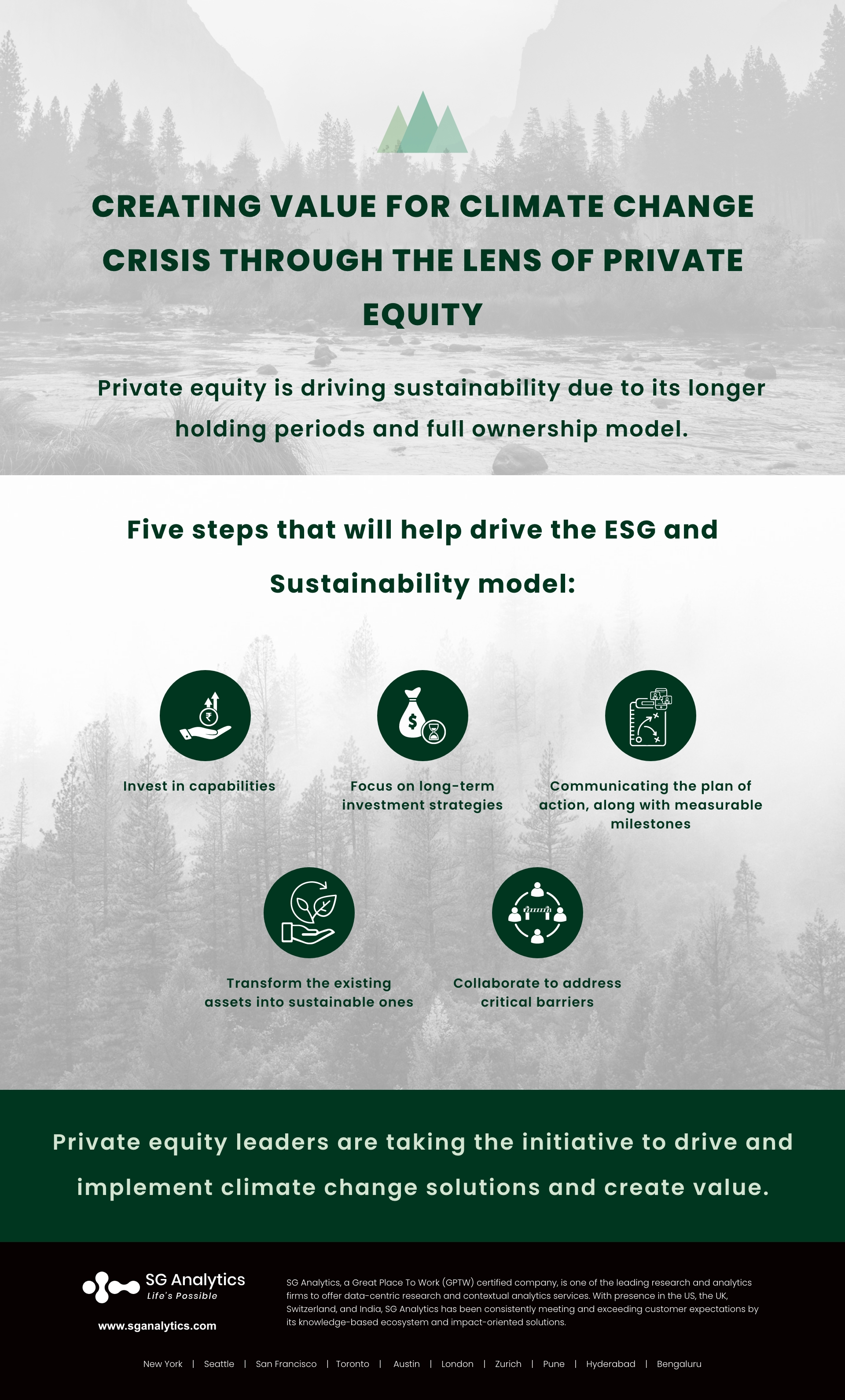Global market investors are experiencing a period of great risk as well as a great opportunity. Asset owners, along with private-equity funds, are facing strain to make real progress on environmental, social, and governance (ESG) issues. This presents not only financial, reputational, and regulatory risks but is also implying on prospecting long-term value creation. With its structural benefits due to full ownership of the ESG model and its longer-term horizon, private equity firms can be leading the sustainable finance revolution.
Investors across the private and public landscape are facing ratcheting pressure to allocate their capital in sustainable ways that can help create progress on environmental and social issues, along with delivering returns.
In private equity, general partners (GPs) and limited partners (LPs) are taking action to address the existing environmental and social imperatives that are referred to as sustainable finance. With private equity, investors now have an opportunity to create real financial value, as it is uniquely positioned to lead the way in seizing value through sustainability.
But the biggest challenge lies in the scope of sustainable efforts undertaken. Today, owing to the ongoing climate crisis, the industry is committing to net-zero objectives, but firms are still working thing way through these primary targets.

Tackling the Crisis
Climate change is being viewed as an existential threat to the world. It remains the most significant ESG issue for asset managers and investors. As per the U.S. SIF Foundation's biennial Report on U.S. Sustainable, Responsible, and Impact Investing Trends, private equity & venture capital ESG assets under management have doubled to $283 billion with 565 funds.
But due to the rise in investment trends, investors are most focused primarily on financing climate-related technologies and enablers. They are working towards gaining insight into opportunities within the private equity climate change landscape and exploring ways to measure the impact of their investments.
Asset managers and investors are viewing sustainable private equity as the key to scrutinizing climate-related risks in their portfolios and investments. Backed by the strong regulatory drive toward sustainability and net zero-emission targets, investors are convincing organizations about the virtues of more sustainable portfolios. Many asset managers are now perceiving the wider impact the investment sector will have on the economy and its efforts to generate new return sources.
Private equity firms are no longer simply factors in the effects of climate change on their investment. They are actively seeking to lessen the climate impact of their portfolio. Sustainable private equity is now moving from niche to mainstream. Sustainable private equity is leading to fostering the innovation required to tackle climate change.
Private equity today possesses an opportunity to transform business models and help both listed and non-listed corporations to become energy-efficient and climate-friendly.
Read more: Biggest BFSI Trends to Watch out for in 2022
Transforming from Grey to Green Assets
Despite the different approaches toward both ESG and ESG impact investing, sustainability is being widely projected as a critical benchmark for investment. Private equity firms are improving their sustainability performance of currently high-emitting assets by subsidizing long-term opportunities to make them greener. The industry is ideally positioning itself to play this role by taking full ownership.
Opportunities that can create value through sustainability
Private-equity investors can create value through sustainability in the following ways-
-
Investing in sustainability leaders: By investing in companies with leading sustainability performance and minimizing exposure to risks.
-
Sustainability-as-a-services: Investors can opt to invest in companies that facilitate data, consulting, engineering, and other transformation services to companies embarking on the sustainability journey.
-
Shifting to a sustainability-driven portfolio: Through the wide deployment of levers, investors can work towards continuous improvement of their sustainability performance by leveraging a shared playbook.
-
Transforming sustainability laggards: By deploying a well-developed toolkit of sustainability-focused strategies and capabilities, private equity investors can buy and transform assets with lagging sustainability performance.
Meeting the world’s decarbonization challenge requires investment as well as engagement. Private equity possesses the ability to support strategic transformations and offers a longer horizon than public markets. It is ideally positioned to meet the need to transform high-emitting assets from grey to green and initiate real progress toward global sustainability.
The three key enablers for this transformation include:
-
Changing the existing emissions reduction frameworks to supplement existing levels-based portfolio targets.
-
Carbon pricing will enable investors to capture the value of their decarbonization initiatives.
-
Clear retirement and decarbonization policies explicitly define the intended trajectories and provide incentives for sponsors to launch bold sustainability transformations.
This will help in making organizations and stakeholders accountable for the fact that the high-emitting assets they divest are sold not to the highest bidder but to new investors with well-defined decarbonization plans.
This ownership model in private equity authorizes meaningful positive change through data and engagement. Sustainability is critical in creating value, and this convergence and standardization of sustainability data will encourage a rapid acceleration in the integration of these factors across companies. Investors are now moving towards improving every aspect of their business to drive growth and enhance operations over the long haul.
Private equity investors are avoiding grey or high-emitting assets to decarbonize their portfolios. With the world rapidly embracing sustainability, companies are working towards improving their performance on ESG issues.
Read more: The Future of Hedge Funds: Top Trends to Watch Out For in 2022

Five steps that will help drive the ESG and sustainability model in private equity:
Investors are driving sustainable change by-
-
Investing in capabilities:
The gap in capabilities is one of the primary obstacles. Confirming leadership encloses people with relevant operational and traditional investment experience along with a sustainability mindset. This is the first step in building institutional capabilities.
-
Focusing on long-term investment strategies:
Developing capabilities and driving a cultural change may lead to a false start. To stay the course of sustainability, private-equity leaders need to consider its greater time horizon flexibility in private markets. Optimizing the strategies for long-term outcomes and embracing experimentation will lead to the lengthening of hold periods.
-
Communicating the plan of action, along with measurable milestones:
Given the time horizon required to witness the results at the asset and portfolio levels, communicating the long-term plan of action and progress to all stakeholders is critical in securing and maintaining buy-in.
-
Transforming the existing assets into sustainable ones:
Private equity’s full-ownership model, flexibility, and relative view of public markets should enable the industry and the investors to transform sustainability-laggard assets. Divestment and sector rotation may offer instantaneous wins for a single investor, but they do not remove sustainability-laggard assets. Investors need to address sustainability challenges head-on and deploy capital to transform these grey assets.
-
Collaborating to address critical barriers:
Addressing measurement challenges and establishing the right stimuli cannot be achieved in isolation. Investment leaders and organizations must continue to collaborate and set standards and policies across the industry to achieve sustainability.
With these key steps, private equity leaders can assist their firms in fully realizing their influential role in decarbonizing. It is time for private equity to take its role in contributing to averting the global crisis of climate change seriously.
Read more: Top Trends That Will Shape Investment Banking In 2022

Key Takeaways
-
Private equity leaders are taking the initiative to drive and implement climate change solutions and create value by decarbonizing higher emitting grey’ assets.
-
Private equity is driving sustainability due to its longer holding periods and full ownership model.
-
The private equity industry is prioritizing and incubating the five key priorities issued by the World Economic Forum and working towards creating sustainable solutions through their investments.
To Sum Up
Private-equity investors are beginning to take action to create value through sustainability. By identifying and inculcating the five key organizational changes, the industry is getting rid of the barriers and unlocking private-equity engagement to support the grey-to-green transformation.
Leading private equity firms have already realized value through sustainability and are now using the space to evolve and build sustainable portfolio companies. While the industry is still facing unique opportunities and challenges, it is realizing its full potential, and investors are working to embrace this experimentation to test and refine their internal processes. Investors are now working to build a roadmap and chart their own sustainability success path.
With presence in New York, San Francisco, Austin, Seattle, Toronto, London, Zurich, Pune, and Hyderabad, SG Analytics, a pioneer in Research and Analytics, offers tailor-made services to enterprises worldwide.
A leader in the Private Equity space, SG Analytics partners with global companies and assists them in acquiring and realizing strategic value from their investments. Contact us today if you are in search of an investment research firm to leverage custom research support across a broad range of asset classes and enhance your investment decisions.









